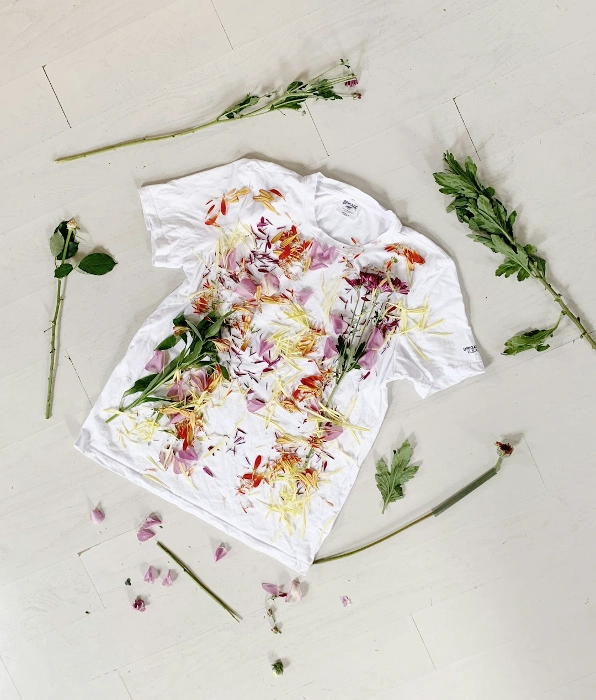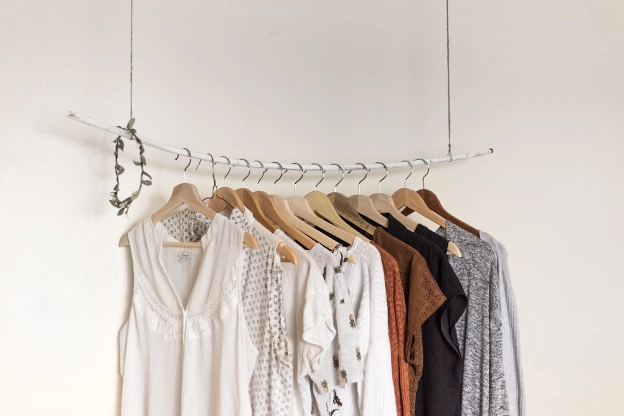10 Sustainable Fashion Trends to Watch

Discover the Latest Sustainable Fashion Trends
As the fashion industry continues to evolve, there is a growing emphasis on sustainability and ethical practices.
With consumers becoming more conscious of the environmental and social impact of their clothing choices, sustainable fashion is no longer just a trend - it's a movement.
In this blog post, we will explore 10 sustainable fashion trends that are shaping the industry and making a positive impact on the planet.
From upcycled materials and zero-waste production techniques to fair trade practices and circular fashion, these trends are not only stylish but also eco-friendly.
By highlighting these innovative approaches to fashion, we hope to inspire readers to make more informed choices when it comes to their wardrobe.
Whether you're a seasoned fashionista or just starting to dip your toes into sustainable fashion, there's something for everyone in this list of trends to watch.
Stay tuned to learn more about how you can incorporate sustainability into your style and make a difference in the world of fashion.
Sustainable Materials
As the fashion industry continues to evolve, more and more brands are turning to sustainable materials to create their products.
From organic cotton and hemp to recycled polyester and Tencel, there is a wide variety of eco-friendly options available for designers to choose from.
These sustainable materials not only help reduce the environmental impact of the fashion industry but also provide consumers with stylish and high-quality clothing options.
By incorporating these materials into their collections, brands are not only contributing to a more sustainable future but also setting trends in the industry.
In our blog post titled "10 Sustainable Fashion Trends to Watch," we highlight the importance of using sustainable materials in fashion and showcase some of the latest trends that are making waves in the industry. From upcycled denim to plant-based leathers, these sustainable materials are not only good for the planet but also look great on the runway and in everyday wear.
Zero-waste design
As the fashion industry continues to evolve, one of the most important trends to watch out for is zero-waste design. This approach focuses on creating clothing and accessories with minimal to no waste during the production process. By utilizing every scrap of fabric and finding innovative ways to repurpose materials, designers can reduce their environmental impact and contribute to a more sustainable future for the industry. Zero-waste design not only helps to minimize the amount of waste that ends up in landfills, but it also encourages creativity and ingenuity in the design process.
As consumers become more conscious of the environmental impact of their fashion choices, zero-waste design offers a solution that is both stylish and sustainable.
By incorporating this trend into their collections, fashion brands can demonstrate their commitment to reducing waste and embracing a more eco-friendly approach to design.
Slow Fashion
As the world becomes more environmentally conscious, the fashion industry is beginning to shift towards more sustainable practices.
Slow fashion is a movement that advocates for quality over quantity, encouraging consumers to invest in timeless pieces that are made to last.
This trend focuses on ethical production processes, fair wages for workers, and reducing the overall carbon footprint of the industry.
By choosing slow fashion, consumers can make a positive impact on both the environment and the lives of garment workers. In a world where fast fashion dominates the market, it is important to consider the long-term effects of our purchasing decisions.
By supporting slow fashion brands, we can help promote a more sustainable and ethical fashion industry. As we look towards the future, it is important to keep an eye on the slow fashion trend and watch as it continues to grow and evolve in the coming years.
Upcycling and Repurposing
Upcycling and repurposing have become increasingly popular trends in the fashion industry as more consumers seek sustainable alternatives to fast fashion. By taking old or discarded materials and transforming them into new and stylish pieces, designers can reduce waste and lessen their environmental impact.
From turning old jeans into trendy denim jackets to creating accessories from vintage fabrics, upcycling allows for creativity and individuality in fashion while also promoting a more eco-friendly approach to clothing production. Repurposing, on the other hand, involves taking existing garments and giving them a fresh new look by altering their design or adding embellishments.
Both practices not only help to reduce the amount of clothing ending up in landfills but also contribute to a more circular economy in the fashion industry. As consumers become more conscious of the environmental impact of their clothing choices, upcycling and repurposing are sure to remain key trends to watch in sustainable fashion.
Ethical Labor Practices in Sustainable Fashion
As the fashion industry continues to grow and evolve, there is a growing emphasis on the importance of ethical labor practices.
More and more consumers are becoming aware of the impact that their clothing choices have on the environment and the people who make them. In response to this demand, sustainable fashion brands are prioritizing fair wages, safe working conditions, and overall ethical treatment of workers throughout their supply chains. By promoting transparency and accountability in their operations, these brands are setting a new standard for the industry and inspiring others to follow suit.
As consumers become more educated about the importance of ethical labor practices, they are increasingly seeking out brands that prioritize these values. From fair trade certifications to supply chain traceability, there are many ways for brands to demonstrate their commitment to ethical labor practices.
By staying informed and supporting brands that align with their values, consumers can help drive positive change in the fashion industry and create a more sustainable future for all.
Vegan Fashion
In recent years, the fashion industry has been moving towards more sustainable and ethical practices, and one of the most prominent trends to watch is vegan fashion.
Vegan fashion refers to clothing and accessories that are made without the use of any animal products or by-products. This includes materials like leather, fur, silk, and wool, which are often associated with animal cruelty and environmental harm. Instead, vegan fashion brands use innovative materials such as organic cotton, bamboo, cork, and recycled plastics to create stylish and cruelty-free products.
Not only are these vegan alternatives better for the planet and animals, but they also appeal to consumers who are increasingly concerned about the ethics and sustainability of their clothing choices.
As the demand for vegan fashion continues to grow, more and more designers and retailers are embracing this trend and incorporating it into their collections.
So, if you're looking to stay trendy and make a positive impact, keep an eye out for vegan fashion in the upcoming seasons!
Local Production
One of the sustainable fashion trends to watch out for is the rise of local production. As consumers become more conscious of the environmental and ethical implications of their purchases, there has been a growing demand for locally-made clothing. By supporting local production, consumers can reduce the carbon footprint associated with transportation and support small businesses in their communities.
Local production also promotes transparency and accountability in the fashion industry, as consumers can easily trace the origins of their clothing and ensure that ethical labor practices are being upheld.
Additionally, local production helps to boost the local economy and create jobs in the community. By choosing locally-made clothing, consumers can make a positive impact on the environment and support sustainable fashion practices.
Gender-neutral Clothing
One of the most important sustainable fashion trends to watch is the rise of gender-neutral clothing. As society becomes more accepting of diverse gender identities, the fashion industry is starting to reflect this shift by offering clothing options that are not limited by traditional gender norms. Gender-neutral clothing is designed to be inclusive and accessible to people of all genders, allowing individuals to express themselves authentically without feeling restricted by societal expectations.
By embracing gender-neutral clothing, consumers can support a more inclusive and diverse fashion industry that prioritizes equality and acceptance. Additionally, gender-neutral clothing often focuses on timeless styles and high-quality materials, making it a more sustainable choice for those looking to reduce their environmental impact. As more designers and brands embrace this trend, we can expect to see a wider variety of gender-neutral options available for consumers who are looking to make more conscious and ethical fashion choices.
Rental and Second-Hand Fashion
One of the top sustainable fashion trends to watch in the coming year is the rise of rental and second-hand fashion.
With the fashion industry being one of the largest contributors to pollution and waste, consumers are becoming more conscious of the environmental impact of their clothing choices.
Renting clothes or purchasing second-hand items helps reduce the demand for new clothing production and gives a second life to pre-loved garments.
This trend is not only eco-friendly but also budget-friendly, allowing fashion enthusiasts to experiment with different styles without breaking the bank. Many online platforms and brick-and-mortar stores now offer rental services or curated selections of second-hand clothing, making it easier than ever for consumers to embrace sustainable fashion choices. By incorporating rental and second-hand fashion into our wardrobes, we can contribute to a more circular and environmentally friendly fashion industry.
Wrapping Up
In conclusion, the world of fashion is evolving rapidly, and sustainable fashion is no longer just a trend – it's a movement that is here to stay.
As consumers become more conscious of the environmental and social impacts of their clothing choices, brands are stepping up to the challenge by incorporating sustainable practices into their designs.
From eco-friendly materials to ethical manufacturing processes, there are numerous ways that the fashion industry is transforming for the better. By staying informed about the latest sustainable fashion trends, we can all make more informed choices about the clothing we buy and support brands that are committed to making a positive impact on the planet. So whether it's embracing upcycled clothing, supporting fair trade practices, or opting for organic fabrics, there are plenty of ways to make a difference through your fashion choices. Together, we can create a more sustainable and ethical fashion industry for generations to come.



